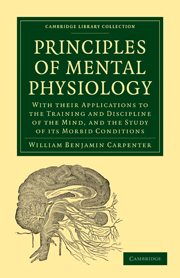 Principles of Mental Physiology
Principles of Mental Physiology Book contents
- Frontmatter
- PREFACE
- Contents
- BOOK I GENERAL PHYSIOLOGY
- BOOK II SPECIAL PHYSIOLOGY
- CHAPTER X OF MEMORY
- CHAPTER XI OF COMMON SENSE
- CHAPTER XII OF IMAGINATION
- CHAPTER XIII OF UNCONSCIOUS CEREBRATION
- CHAPTER XIV OF REVERIE AND ABSTRACTION:—ELECTRO-BIOLOGY
- CHAPTER XV OF SLEEP, DREAMING, AND SOMNAMBULISM
- CHAPTER XVI OF MESMEBISM AND SPIRITUALISM
- CHAPTER XVII OF INTOXICATION AND DELIRIUM
- CHAPTER XVIII OF INSANITY
- CHAPTER XIX INFLUENCE OF MENTAL STATES ON THE ORGANIC FUNCTIONS
- CHAPTER XX OF MIND AND WILL IN NATURE
- APPENDIX. DR. FERRIER'S EXPERIMENTAL RESEARCHES ON THE BRAIN
- INDEX
CHAPTER XV - OF SLEEP, DREAMING, AND SOMNAMBULISM
Published online by Cambridge University Press: 29 August 2010
- Frontmatter
- PREFACE
- Contents
- BOOK I GENERAL PHYSIOLOGY
- BOOK II SPECIAL PHYSIOLOGY
- CHAPTER X OF MEMORY
- CHAPTER XI OF COMMON SENSE
- CHAPTER XII OF IMAGINATION
- CHAPTER XIII OF UNCONSCIOUS CEREBRATION
- CHAPTER XIV OF REVERIE AND ABSTRACTION:—ELECTRO-BIOLOGY
- CHAPTER XV OF SLEEP, DREAMING, AND SOMNAMBULISM
- CHAPTER XVI OF MESMEBISM AND SPIRITUALISM
- CHAPTER XVII OF INTOXICATION AND DELIRIUM
- CHAPTER XVIII OF INSANITY
- CHAPTER XIX INFLUENCE OF MENTAL STATES ON THE ORGANIC FUNCTIONS
- CHAPTER XX OF MIND AND WILL IN NATURE
- APPENDIX. DR. FERRIER'S EXPERIMENTAL RESEARCHES ON THE BRAIN
- INDEX
Summary
470. A large portion of the Life of every Human being is passed in a state of more or less complete suspension of the Animal powers of sense and motion ; the continued maintenance of those powers requiring periodic intervals of repose, winch seem to be employed in the removal of the products of the “waste” of the Nervous and Muscular tissues that is produced by the exercise of them, and in the repair of the deteriorated mechanism by Nutritive regeneration. The degree of this suspension, however, varies so greatly, as to render it inappropriate to include under one category all the states that are intermediate between ordinary profound Sleep and complete Wakefulness. And as, in the preceding Chapter, we have considered the most characteristic of those which may be regarded as modifications of the waking state, so we shall now treat of those of which sleep may be taken as the type. In so doing, it will be convenient to commence with the state of ordinary ‘profound Sleep, which may be denned as one of complete suspension of sensorial activity : the consciousness of the Ego being neither excited by impressions made on the nerves of his external senses and transmitted upwards to his Sensorium, nor by the downward transmission through the nerves of his internal senses of the results of changes taking place in his Cerebrum (§ 100).
- Type
- Chapter
- Information
- Principles of Mental PhysiologyWith their Applications to the Training and Discipline of the Mind, and the Study of its Morbid Conditions, pp. 568 - 610Publisher: Cambridge University PressPrint publication year: 2009First published in: 1874


